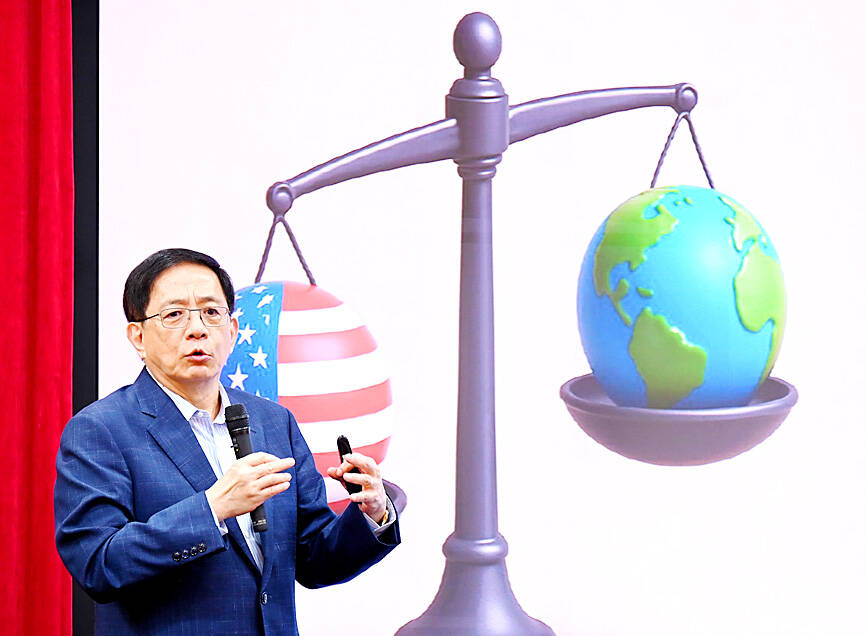Taiwan faces threats from the US as well as China, and it cannot allow its future to be controlled by a handful of “extremists” in the government, former National Taiwan University (NTU) president Kuan Chung-ming (管中閔) said on Saturday.
Kuan made the remarks in a speech titled “When a Bull Enters a China Shop” — a reference to US President Donald Trump’s China diplomacy — at an event organized by the Taiwan People’s Party.
Regarding Taiwan’s current geopolitical situation, the country faces risks from the US, such as tariffs and the costs of a deal to ease them, shifts in semiconductor supply chains, policy uncertainties and the White House’s demand that Taiwan pay “protection fees,” Kuan said.

Photo: Chu Pei-hsiung, Taipei Times
“To Trump, in particular, there is nothing more important than buying and selling, and Taiwan has no way of predicting what will be included in those deals,” he said.
At the same time, Taiwan continues to be “highly dependent” on China for trade, even as cross-strait relations deteriorate, he said, adding that Taiwan could increasingly find its economy squeezed by both Beijing and Washington.
Just as Trump told Ukrainian President Volodymyr Zelenskiy that he does not “have the cards” in prevailing in Russia’s invasion, Taiwan must also think about “what cards it holds,” Kuan said.
Economically, Taiwan should use the pressure from China and the US to spur economic reforms, including further opening its markets and cultivating more diverse service-sector industries, he said.
It should also seek to “stabilize” its relations with China, he said.
In terms of security, “Trump likes making deals, and it is possible that he will make a deal on Taiwan’s security,” Kuan said.
Rather than becoming a pawn for the US, Taiwan needs to find a way to act with initiative and agency between Washington and Beijing, he said.
Turning to the government, Kuan said that cross-strait relations were being led by a Democratic Progressive Party (DPP) administration that won only 40 percent of the votes in last year’s presidential election.
“The future of 23 million people should not be controlled by a small number of extremists in the DPP,” he said.
Although Taiwan is not the primary actor in cross-strait relations, it has the ability to “balance” its relations with the US, and thus ease some of the risks it faces from China, he said.
Kuan, an economist, was president of NTU from 2019 to 2023 and was National Development Council minister in 2014 and 2015 under then-president Ma Ying-jeou (馬英九).

Taiwanese were praised for their composure after a video filmed by Taiwanese tourists capturing the moment a magnitude 7.5 earthquake struck Japan’s Aomori Prefecture went viral on social media. The video shows a hotel room shaking violently amid Monday’s quake, with objects falling to the ground. Two Taiwanese began filming with their mobile phones, while two others held the sides of a TV to prevent it from falling. When the shaking stopped, the pair calmly took down the TV and laid it flat on a tatami mat, the video shows. The video also captured the group talking about the safety of their companions bathing

US climber Alex Honnold is to attempt to scale Taipei 101 without a rope and harness in a live Netflix special on Jan. 24, the streaming platform announced on Wednesday. Accounting for the time difference, the two-hour broadcast of Honnold’s climb, called Skyscraper Live, is to air on Jan. 23 in the US, Netflix said in a statement. Honnold, 40, was the first person ever to free solo climb the 900m El Capitan rock formation in Yosemite National Park — a feat that was recorded and later made into the 2018 documentary film Free Solo. Netflix previewed Skyscraper Live in October, after videos

Starting on Jan. 1, YouBike riders must have insurance to use the service, and a six-month trial of NT$5 coupons under certain conditions would be implemented to balance bike shortages, a joint statement from transportation departments across Taipei, New Taipei City and Taoyuan announced yesterday. The rental bike system operator said that coupons would be offered to riders to rent bikes from full stations, for riders who take out an electric-assisted bike from a full station, and for riders who return a bike to an empty station. All riders with YouBike accounts are automatically eligible for the program, and each membership account

A classified Pentagon-produced, multiyear assessment — the Overmatch brief — highlighted unreported Chinese capabilities to destroy US military assets and identified US supply chain choke points, painting a disturbing picture of waning US military might, a New York Times editorial published on Monday said. US Secretary of Defense Pete Hegseth’s comments in November last year that “we lose every time” in Pentagon-conducted war games pitting the US against China further highlighted the uncertainty about the US’ capability to intervene in the event of a Chinese invasion of Taiwan. “It shows the Pentagon’s overreliance on expensive, vulnerable weapons as adversaries field cheap, technologically